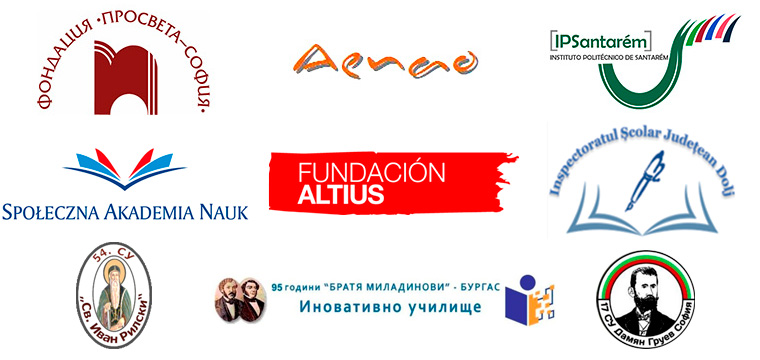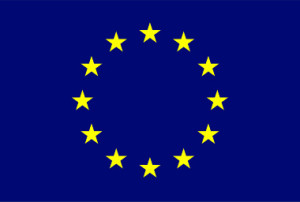The consortium has been formed considering partners’ experience in the project subject area and corresponding activities, as well as the relevance of Respecting and Valuing Otherness and Diversity themes in the partners’ context with all partners coming from countries which are the external borders of the EU.
Prosveta Foundation – Sofia, Bulgaria (Coordinator)
Center of non formal education AENAO – Greece
Institute Polytechnic of Santarem – Santarém, Portugal
Fundación ALTIUS – España
The Dolj County School Inspectorate – Romania
University of Social Sciences – Poland
Bratya Miladinovi Primary School – Burgas, Bulgaria
54 Secondary School “St. Ivan Rilski” – Sofia, Bulgaria
17 Secondary School “Damyan Gruev” – Sofia, Bulgaria

 Funding institution: Erasmus+Key Activity 2:
Funding institution: Erasmus+Key Activity 2:
Cooperation for innovation and the exchange of good practices
Strategic Partnerships for school education
Fondacia Prosveta – Sofia
Prosveta Sofia Foundation is a non-government non-profit organization. It was founded in 2007 as a legal entity with non-profit public benefit. Its mission is to support the modernization of Bulgarian education and work to improve its quality. It supports the implementation of leading European and world standards in Bulgarian school education through various initiatives.
Prosveta Sofia Foundation has extensive experience in conducting training and awareness seminars. For its seven years of existence it has organized more than 250 workshops with teachers on current educational problems concerning the teaching and learning process in pre-school and primary school, as well as the implementation of modern methodological approaches in teaching basic subjects taught from 5th to 12th grades. It has organized a number of workshops with school principals on implementing delegated budgets, on topics related to effective ways of constituting working school boards, to building and supporting the credibility of public schools in local communities, etc.
Prosveta-Sofia Foundation has been subcontracted by the Ministry of Education to run a number of projects after tight competition procedures of open tenders in a couple of projects under Human Resources Development Operational Programme:
“Analytical and information support of the approbation of inspection model of Education” project, 2012-2014, BG051PO001-3.2.05 involving:
– Analysis and evaluation of the set system of criteria and indicators to evaluate the achieved quality of education as suggested in state educational standard for inspection;
– Analysis and evaluation of the planned draft for state educational standard inspection methodology, methods and tools in carrying out the inspection.
“Creation of test tasks for ongoing review and assessment of learning outcomes of illiterate and poorly literate persons over the age of 16 who are involved in literacy courses and courses to master the learning content for 5, 6 and 7. grades” project, 2012-2013, BG051PO001-4.3-01
“Development of topics including interactive exercises of career guidance to students” project, 2013 – 2014, BG051PO001-4.3.02. The subject of the project is the development of 80 topics with interactive exercises for career guidance of students from 5 to 12 grades. 10 topics with interactive exercises have been developed for each grade that are tailored to the stages of career development of students.
The experts and associates we work with are experienced in providing teacher trainings and designing educational contents for all school education stages, as well as designing scripts for multimedia objects which are being outsourced to multimedia companies.
Aenao – Greece
The N.G.O Α.Ε.Ν.Α.Ο was established in 2006 in Thessaloniki in order to promote health, on its wide sense, and to encourage the dialogue between science, culture and religion. It occupies a group of scientists- volunteers and is coordinated by experienced scientists.
AENAO aims to:
- Promote health by creating networks and implementing projects based on non-formal education and learning by experience methodology.
- Inform the community on issues regarding science in the broad sense, culture, religion and education.
- Undertake national and international collaboration with reliable agents, in order to exchange experience and best practices.
- Design programs that encourage social cohesion, protect the human rights and respect the environment.
- Empower women to take initiatives and improve their socio-economic status.
- Empower young people, enhance and build their personal skills.
- Inform society on innovative programs and activities.
- Organize campaigns and initiatives that benefit the society.
AENAO’s educational material in the field of health promotion (project “Addicted to life” dealing with smoking prevention) won the first award and has been recommended for the school curriculum.
Additionally, the projects “Captain Cook” dealing with healthy lifestyle and “Crash test revised”, dealing with conflict management became “best practices”.
AENAO is an active member of “Healthy Network”, “ORESTIS” and Anna Lindh foundation.
AENAO has great experience in local, national and international projects. The topics are explored by learning by doing methodology and non-formal education.
In 2008 AENAO, in a pilot project, introduced non-formal education in the university settings. The project had very positive impact among the university students and non-formal education was adopted as strategic in MSc degrees.
AENAO cooperates with schools, youth clubs, municipalities, health centers and local authorities and implements projects that arise from the needs’ assessment of the target groups.
IPSantarém – Portugal
The Polytechnic Institute of Santarém is an institution of public higher education (tertiary level) that began its activity in 1979 and consists of the following Schools: Agriculture, Sports, Education, Management and Technology and Health.
The Higher School of Education of Santarém (ESES) was created by Decree-Law No. 513-T/79 of 26 December as the organic unity of the Polytechnic Institute of Santarém and is an institution of tertiary level, aimed at teaching, research, service to community and collaboration with national and foreign activities of common interest.
Attended by 696 students, is currently operating the degrees of First Cycle of Basic Education, Childhood Education, Social Education, Cultural Animation and Community Education, Education and Communication Multimedia and Visual Arts and Multimedia.
The ESES is also focusing on training courses in order to meet the professional, civic and cultural needs that are felt throughout life, in society. Our school promotes innovative practices for teachers of all educational levels in several areas, e.g. Arts; ICT; Multimedia, inter-cultural communication among other
The ESES have got previous experience from Leonardo Da Vinci and Erasmus + projects and many other European and domestic programmes. The school community considers that involvement in Erasmus + programmes provides a chance to develop products and acquire experiences that broaden horizons, develop the mind and allow involved parties to become true European citizens with an understanding of other cultures and education systems.
Fundación ALTIUS – España
Altius Foundation is a non-profit organization set up in 2002. The Foundation promotes diverse initiatives on education, training, employment, social integration and cooperation for development. Altius is a key actor in terms of promoting and enabling youth participation in social life, focusing on needs of disadvantaged people.
The Foundation is hosting a Europe Direct Information Centre (EDIC) supported by the EC. Main aim is to bring EU closer to the citizens giving information, advice and assistance on EU´s policies and programmes.
Altius carries out important programmes to promote volunteering:
– 1 kilo of Help (http://1kilodeayuda.org) works over 15 years supported by more than 200 volunteers, introducing a novel concept of solidarity: the ability to help every day of the year in a simple way.
– I cook employment (http://yococinoempleo.org), providing job opportunities and training, and also food to cover basic needs of job seekers, supported by over 100 volunteers.
The Dolj County School Inspectorate – Romania
The School Inspectorate is a public institution which provides guidance activities, coordination and control based on the highest professional standards for education and training institutions.
The main role of the School Inspectorate is to contribute to the quality of educational services, continuous improvement and efficiency of the regional and/or national education system and its compatibility with European systems.
- coordinates all public and private educational activities from all the schools of Dolj county: pre-primary, primary, secondary and post-secondary;
- promotes the national educational strategy in our own county;
- is based on strategic communication between the Romanian Ministry of Education and all the schools from our county;
- ensures the quality of the educational process;
- supports the institutional development of schools for consolidating their autonomy, in accordance with the national standards;
- implements the decisions and procedures that are taken at national level in our county.
University of Social Sciences – Poland
University of Social Sciences is the largest private educational institution in Poland, with more than 25 years of experience. It is the most popular non-public university in Poland according to the Ministry of Science and Higher Education. It provides high-quality education to students from all over the world. The University offers a wide range of Bachelor’s and Master’s programs. Its offer also includes MBA and PhD studies and a unique American Master’s degree program in cooperation with Clark University.
The University’s goal is to equip students and graduates with specialist knowledge and practical skills needed in the 21st century’s labor market, both at the local and international levels. Therefore, all of its programs are developed in close cooperation with partner companies and institutions and provide students with an opportunity to participate in internship programs and various projects in a real-world business environment. The University’s educational programs reflects the needs of the rapidly changing world. Up-to-date majors: International Business Management, Computer Science, International Tourism and Hospitality Management and many others.
Without doubt, its well-equipped didactic and research facilities are the University’s strong point. They enable efficient teaching and make it possible to carry out various scientific and research projects. What distinguishes its premises is its modern and functional design. What’s more, The University is conveniently located in the centre of the major cities: Warsaw, Lodz and Cracow and a branch campus in London.
University of Social Sciences also offers assistance of the Student Career Centre, student exchange within the Erasmus+ program and bilateral agreements with prestigious partner universities all over the world and others additional activities, including sports, getting acquainted with the Polish culture, sight-seeing, student events and competitions.

